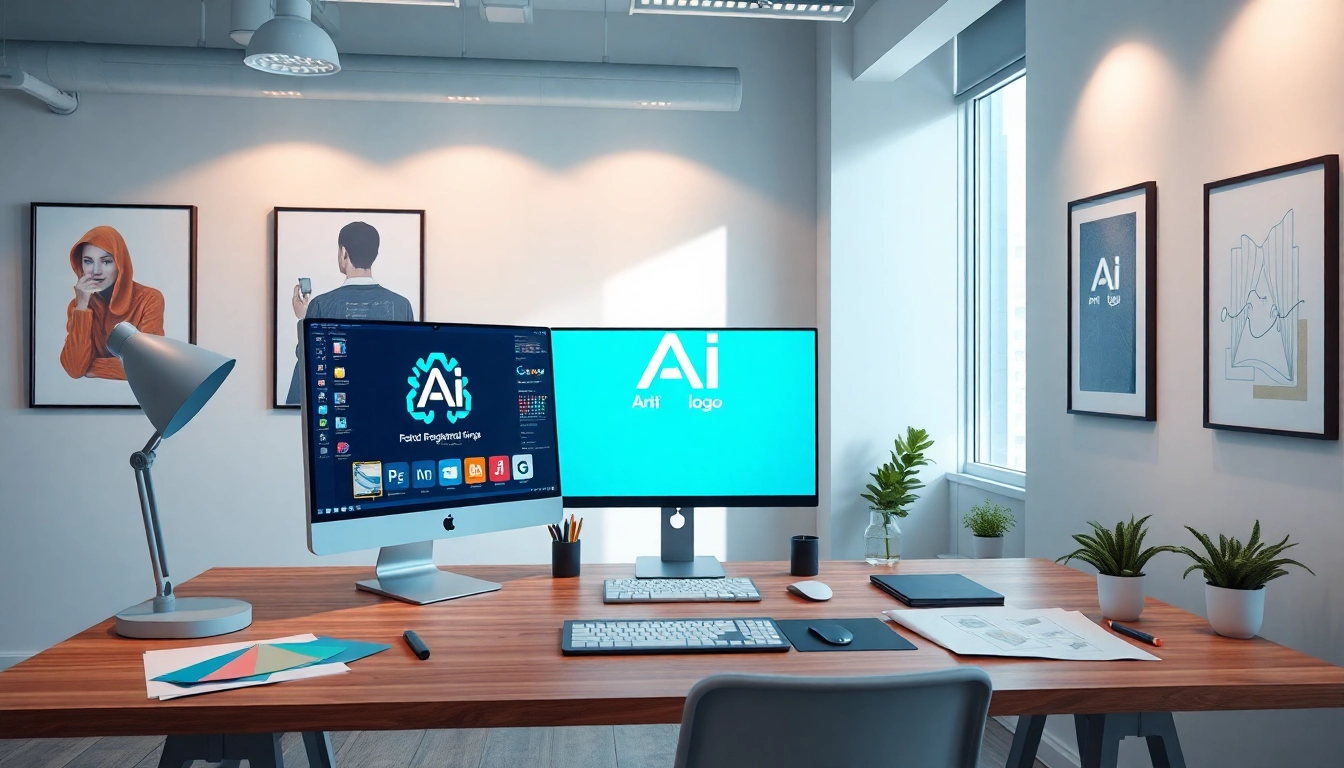Understanding AI-Powered Branding Services
In today’s rapidly evolving digital landscape, businesses are continually seeking innovative solutions to enhance their branding and marketing efforts. One of the most transformative advancements in this domain is the rise of AI-powered branding services. These services leverage sophisticated algorithms and machine learning to create, manage, and optimize brand identities at an unprecedented scale and efficiency.
What Are AI-Powered Branding Services?
AI-powered branding services encompass a suite of tools and technologies designed to assist brands in developing their identity and communicating effectively with their audiences. These services utilize artificial intelligence to automate tasks traditionally performed by designers, marketers, and branding consultants. From logo creation to brand strategy development, AI can analyze vast amounts of data to generate insights and design elements that resonate with target demographics.
The Benefits of AI in Branding
- Efficiency and Speed: AI tools can streamline the branding process, delivering results in a fraction of the time it would take manual efforts.
- Data-Driven Decisions: By analyzing consumer behavior, preferences, and market trends, AI provides valuable insights that inform branding decisions.
- Cost-Effective Solutions: Automating repetitive tasks allows businesses to allocate resources more efficiently, often reducing overhead costs associated with traditional branding approaches.
- Enhanced Personalization: AI can help create tailored brand experiences, engaging consumers on a personal level.
- Scalability: AI-powered services can easily scale to accommodate growth, ensuring that branding efforts evolve alongside the business.
Key Features to Look For in Services
When exploring AI-powered branding services, several key features should be considered to ensure they meet the specific needs of your brand:
- Customizability: Look for services that allow you to tailor the output to reflect your brand’s unique voice and style.
- Integration capabilities: The platform should seamlessly integrate with your existing tools and workflows.
- Analytics and Reporting: Robust analytics can measure the effectiveness of branding campaigns and provide detailed insights into consumer engagement.
- Collaboration Tools: Features that enable team collaboration can enhance communication and creativity.
- Real-Time Adaptability: The ability to adjust campaigns and branding elements based on real-time data is invaluable.
How AI Enhances Brand Design
A significant aspect of branding is design, and AI is revolutionizing how businesses approach this critical element. By utilizing AI tools, brands can create more impactful visual identities that connect with their audiences.
Customizing Your Brand Identity with AI
AI technology enables brands to customize their identities through data analysis and algorithm-driven design principles. With the ability to understand consumer preferences, AI can generate design recommendations that align with what resonates with target audiences. This process often involves:
- Color Palette Generation: AI can suggest color schemes based on psychology and trends that appeal to different demographics.
- Typography Suggestions: Automated systems can choose fonts that complement brand messaging and aesthetics.
- Logo Design Variants: By analyzing successful logos in a given industry, AI can propose variations that balance creativity and brand recognition.
AI Tools for Logo and Graphic Design
Taking advantage of AI in logo and graphic design has become increasingly accessible. Various platforms, such as Looka and uBrand, provide tools for businesses to create custom logos effortlessly. These tools typically feature:
- Intuitive Interfaces: Many AI design platforms offer user-friendly interfaces that make it easy for anyone, regardless of design experience, to create a unique brand visual identity.
- AI-Driven Inspirations: The systems often come equipped with photo galleries and style guides from which users can draw inspiration tailored to their industry or preferences.
- Adaptive Learning: Some AI tools learn from users’ preferences over time, improving suggestions and outputs based on past interactions.
Examples of Successful AI Branding Solutions
Numerous brands have successfully integrated AI into their branding strategies, yielding impressive results. For instance, Looka’s platform enables users to generate logos and brand identities quickly, and the user-driven model ensures that designs appeal to real audiences. Similarly, companies like Jasper leverage AI for content generation, helping brands establish compelling narratives around their identities.
Implementing AI Branding in Your Strategy
Integrating AI branding solutions into your overall marketing and branding strategy requires careful planning and execution. Below are some essential steps to guide the process.
Steps to Integrate AI-Powered Branding Solutions
- Assess Your Needs: Identify the specific branding challenges your business faces and determine how AI can address these issues.
- Research Options: Explore various AI-powered branding tools and platforms, comparing features, user experiences, and costs.
- Develop a Strategy: Create a clear implementation plan that outlines objectives, timelines, and assign roles and responsibilities.
- Train Your Team: Ensure your marketing and design teams are trained on the new technologies to maximize their potential.
- Launch Pilot Projects: Start with small-scale projects to evaluate the effectiveness of the AI tools in your branding approach before full-scale implementation.
Common Challenges and How to Overcome Them
While integrating AI-powered branding services can yield significant benefits, several challenges may arise:
- Resistance to Change: Team members may be skeptical about adopting new technologies. To mitigate this, involve them in the selection process and educate them on the benefits of AI solutions.
- Data Privacy Concerns: Assure stakeholders that AI tools comply with data protection regulations and maintain transparency regarding data usage.
- Technical Issues: Ensure there are technical support options available and familiarize your team with troubleshooting resources.
Measuring the Impact of AI on Brand Performance
To understand the success of AI branding efforts, it’s essential to establish key performance indicators (KPIs). Metrics to consider include:
- Engagement Rates: Analyze data on how audiences interact with your branding materials.
- Conversion Rates: Assess how effective the branding changes are at converting leads into customers.
- Brand Recognition: Conduct surveys to measure brand recall and recognition in target demographics over time.
- Return on Investment (ROI): Calculate the financial returns from AI-powered branding investments.
Case Studies: Successful Use of AI in Branding
Real-life examples illuminate the effectiveness of AI in branding applications. Let’s examine a few notable case studies.
Startup Success Stories
Numerous startups credit their initial branding success to AI solutions. Companies like uBrand have empowered entrepreneurs by providing streamlined branding services, enabling them to launch quickly without the need for extensive design knowledge. These businesses have utilized AI to hone their branding strategy, establish brand identity, and effectively engage their target markets from the outset.
Lessons from Established Brands
Established brands like Coca-Cola and Nike are also leveraging AI to refine their branding efforts. For instance, Coca-Cola’s use of AI for creating personalized advertising campaigns helped them engage consumers on a deeper level, resulting in increased brand loyalty and market share. Learning from their approaches can provide insight into the potential scope and application of AI in a branding context.
Innovative Campaigns Powered by AI
Campaigns that employ AI to analyze data and optimize branding strategies continue to emerge. An exemplary case is the campaign launched by Starbucks, which used AI to tailor marketing messages to individual customer preferences, enhancing user experience and contributing to sales growth. By employing similar methodologies, businesses can tap into personalized branding that resonates with consumers.
The Future of Branding with AI
The branding landscape is continually evolving, driven by advancements in technology. As AI continues to progress, its impact on branding is poised to expand significantly.
Trends to Watch in AI Branding
Several trends are shaping the future of AI-powered branding, including:
- Increased Personalization: The demand for personalized customer experiences will drive further innovation in AI tools, allowing brands to create more targeted and relevant content.
- AI-Driven Content Creation: Advancements in natural language processing will enhance AI’s ability to generate creative content tailored to brand messaging.
- AR and VR Integration: The blending of AI with augmented reality (AR) and virtual reality (VR) will allow brands to create more immersive experiences for consumers.
How to Stay Ahead of Competition
To stay competitive in an increasingly AI-driven market, brands must remain agile and open to adopting new tools. This involves:
- Continuously Learning: Stay informed about the latest trends and advancements in AI technology and how they can enhance branding efforts.
- Experimenting with New Tools: Regularly test out new AI tools and features to maintain a fresh and engaging brand presence.
- Building a Strong Data Foundation: Ensure that data collection and analysis processes are in place to maximize the benefits of AI insights.
Preparing Your Brand for AI Innovations
Embracing AI innovations requires a proactive approach. To prepare your brand:
- Invest in Training: Prioritize training for your team to effectively utilize AI tools in branding.
- Foster Innovation: Create a culture that encourages experimentation and exploration of new ideas in branding.
- Build Strategic Partnerships: Collaborate with AI experts and technology providers to enhance your branding initiatives.
In summary, AI-powered branding services represent a significant leap forward for businesses looking to enhance their brand identity and engage effectively with consumers. By leveraging the capabilities of AI, brands can achieve greater efficiency, personalization, and insights, positioning themselves for long-term success in a dynamic marketplace.



